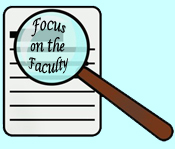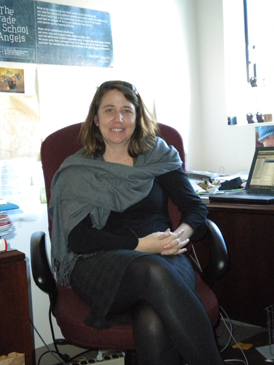Department of English


"There is no use for poems in the world beyond enjoyment. They are not really useful. Poetry is the one profession that has never paid."
This is how Carol Ann Davis thought about poetry while studying journalism as a sophomore in college before she began to study poetry seriously.
Even though today she is an avid poet, Davis did not always follow this career path. Before taking the creative writing path, she studied journalism. She was torn between doing what she loved and having a job that paid.
In college, she worked for The New York Times as a stringer and had an article published. She thought she had her career laid out for her. She says her philosophy was "As long as I'm writing, I'm doing what I love."
However, Davis still took classes in fiction writing at Vassar College. After one of her English teachers told her he saw her writing talent in poetry not fiction, her whole perspective changed. That was the confidence she needed that nobody had given her until her junior year of college.
"Truth is I've always written poems and didn't have the self-esteem or confidence to say, 'Yeah I'm going to be allowed to do this with my life.'"
Davis is from New Smyrna Beach, Fla. She has an MFA in poetry writing from the University of Massachusetts, Amherst. She has taught at Randolph-Macon Women's College in Virginia, Stonehill College and Endicott College, both in Massachusetts, before moving to College of Charleston, where she accepted a position as assistant professor of English in 2000.
Now an associate professor, Davis mainly teaches poetry. When asked if she ever regrets not going into journalism she says, "I don't think about it now because it was such a fated and good set of circumstances that led to poetry. I had so much support when I started that it was pretty clear to me, and I felt so good doing it."
However, she says being a poet is not easy. A poet does not go into the profession to make money. In fact most make little or no money from the books they sell. Poets have to love what they do and they need a lot of patience and persuasion to pursue this career.
It took Davis 11 years before her first book of poems was published by Tupelo Press in 2007. She says poetry publication is different than fiction because poets usually do not have agents to help them. Davis says there is a lot of submitting poems to different contests. She says she has sent different poems to about 50-75 contests.
"I never won one, but I was always in the top 25," she says, "I just kept sending and was finally runner up for Tupelo Press' Dorset Prize." The publisher decided to publish the winner's book as well as Davis'.
She says she had it easier than most poets during this time because she had a job as a professor, making life less stressful.
On the big day when she received a copy of her book, "Psalm," she says it was almost like the poems were new because it did not get published until two years after she submitted everything.
Tupelo Press, the same publisher that published "Psalm," will publish her new book "Atlas Hour" in 2011.
Davis also makes sure her students are aware of the difficult journey of writing poetry. To show this she puts her students through a series of steps to make sure that they know what the profession is all about and if they really love what they do. One step is making them write a number of poems each week, but does not check them until they have completed 35 poems by mid-term.
Sarah Tarkany, one of Davis's students, says, "Carol Ann also takes a personal interest in her students, always more than willing to meet out of class to discuss poetry and life. While she can offer insight as a writer who has been on the journey 15 years longer than any of us, she also admits that every poet has failings, and the journey never really reaches a culmination."
When her first book was published, she received a grant that allowed her students to come with her to book signings in New York City at the Poets House and in Washington, D.C. at the Library of Congress.
She also shares her drafts with her students and tells them about the different contests. "I feel that a lot of students deal with the same thing I was going through when I was thinking about journalism, which is that I loved writing, but didn't have confidence to say that I was going to write poems," she says.
One of her previous students, Ben Thrasher, said "From my experiences with her, both as an adviser and a professor, what distinguishes Carol Ann is her commitment to her students and their work. There is some sort of strange mix of mysticism and philosophy that goes on into each of her classes, and Carol Ann cultivates it, facilitates it, takes it to another location and asks a sublime question about it that will make your head spin."
Not only is she a professor and writer, but she is also poetry editor of the nationally acclaimed literary magazine, "Crazyhorse." As you walk to her office, there are boxes upon boxes of papers, submissions to the literary magazine. She will read all of the poetry submissions and collaborate with other editors to choose which ones get published.
Davis is also the director of the creative writing concentration within the English major. Since 2001 she has also advised "Miscellany," the College of Charleston's student literary magazine.
Davis did not know what was in store for her after college. But now that she has been writing for 20 years, she says she knows she will continue writing and spreading her love of poetry to her students.
###